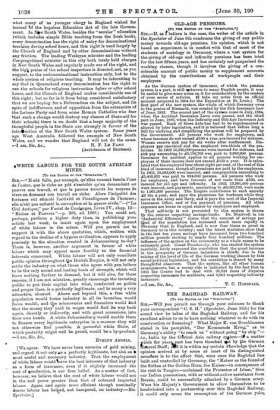OLD-AGE PENSIONS.
[To T113 Karma Or TIIII .srscrAroa..j
SIR,—If, as f believe is the case, the writer of the article in the Spectator of. June 9th condemns the giving of any publics money towards old-age pensions, his opinion, which is not based on experience, is in conflict with that of most of the students of sociology in Germany, where a vast system for the giving of old-age and infirmity pensions has been tried for the last fifteen years, and has certainly not pauperised the working classes, though it involves the giving of a con- siderable amount of public money to supplement amounts obtained by the contributions of workpeople and their employers.
As the German system of insurance, of which the pension system is a part, is still istknown to many English people, it may be useful to give some notes on it for consideration by the readers of your series of articles. eI take my notes from an official account prepared in 1904 for the Exposition at St. Louis.) The first part of the new system, the whole of which Germany owes to the genius of Bismarck, was created by the Sick Insurance Law of Juno, 1883. The second part of the system came in July, 1884, when the Accident Insurance Laws were passed, and the third part in June, 1889, when the Infirmity and Old-Age Insurance Act was passed. Each of these Acts has had to be supplemented or altered by later legislation, and it is believed that before long a Bill for unifying and simplifying the system will be prepared by the Government. All persons who work for employers, and whose incomes do not exceed £100 a year, are insured for sickness. Women receive sick pay for six weeks after confinement. Em- ployers pay one-third and the employed two-thirds of the pre- miums. In 1902 10,320,000 persons were insured for sickness, and sick pay amounting to 49,158,705 was paid to 3,983,900 persons. Insurance for accident applies to all persons working for em- ployers if their income does not exceed £150 a year. It is calcu- lated that the employed bear about eight per cent. of the cost of this kind of insurance, though all premiums are paid by the employers. In 1902, 19,083,000 were insured, and compensation amounting to 45,406,655 was paid to 834,600 persons. All persons who work for employers, and have incomes of not more than £100, are insured for old. age and infirmity. In 1902, 13,381,000 persons ware insured, and payments, amounting to 46,020,705, were made to 1,061,000 persons. The Empire contributes to each annuity £2 10s. a year, and pays the premiums for workmen while they serve in the Army and Navy, and it pays the cost of the Imperial Insurance Office, and of the payment of pensions. All other expenses are borne in equal shares by employers and employed.
That self-help is not prevented by this system is shown by the returns respecting savings-banks. Dr. Shadwell in his 1:Industrial Efficiency" states that the amount of savings per ad of the population has increased much more rapidly in
rmany than in England, and is now four times as great in Germany as in this country ; and the latest statistics show that in the last ten years savings have increased from two hundred million pounds sterling to nearly four hundred millions. The influence of the system on the community as a whole seems to be extremely good. Count Posrulowsky, who has studied the system carefully, lately expressed the conviction that the great increase in the prosperity of German industries is chiefly due to the raising of the level of life of the German working classes by this social-political legislation, and his conviction is shared by many thoughtful observers. That the system, like all other human arrangements, has a seamy side is indicated by the fact that in 1905 the Courts had to deal with 95,833 cases of disputes respecting insurance for accidents, and 9,961 respecting infirmity insurance.


























































 Previous page
Previous page